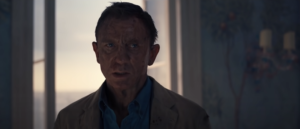
Daniel Craig in the trailer for ‘No Time to Die.’
The release of the new James Bond film was delayed three times but is scheduled for November 20th. Fans in my household who saw the trailer are worried it will waste the final appearance of Daniel Craig, whom they believe is better in the role than Sean Connery, the Bond icon.
No Time to Die is the 25th film in a series that, adjusted for inflation, is the most financially successful of all time. Over that run, and through dozens of novels, short stories, and graphic novels, written by a dozen writers, Bond is not always the same character. Yet there is something common to the various portrayals. Call it the archetype of servant-to-rough-justice, which satisfies our moral need even as it subverts it.
This is a problematic hero, to say the least. Like all movie superheroes, Bond’s power comes from violence. He is also the ideal government worker, even monarchist, a human version of the autonomous drone. He is wrath and vengeance, which he prides himself on executing as coldly (sociopathically) as a god. He has a license, after all, but it is extrajudicial.
By watching in such great numbers for so many decades we admit that deep down in places we do not talk about at parties, we want him on that wall, we need him on that wall. (One wishes now he could be on security detail for a certain Nobel writer, against the dictator’s secret police.) He is our admission of failure: not only do our political, legal, and other systems not protect society, but the human experiment cannot go smoothly without vicious corrections. He is a fairy tale, with the moral being the problem.
The new movie shows Bond has retired since we last saw him. I am interested in that narrative problem too. How does an untouchable retire, as if he had passed his career as a middle-school teacher? What does he do all day? Where? With whom? Can he sleep?
The Craig Bond has no family, and he says (in Quantum of Solace) that he has no friends. Like all the other women he is drawn to, even M (“mum”) is dead by violence. He loves sex (with married women, he says) and is a high-style consumer, but he is never shown enjoying a book, a play, a film, the theater, dance, visual art, nature, a garden, children, or pets. He never works with his hands to create something other than an IED.
It is easy to imagine he would continue a regimen—working out, eating well—but that does not preclude abusing alcohol, which he has done plenty in the films. He might enjoy bombing-around in a vintage Land Rover, then cleaning it to military standards in his garage. Maybe he meets a gal-pal for dinner and tiresome Fifties lovemaking montages.
But would he not continue to see everyone around him through the lens of what he has done? The folks in the retirement community would seem weak and clueless, by comparison, and the common huckster would be someone to play with maliciously.
Bond would have all the money and security in the world, with his double pension (MI6 and Royal Navy/SAS/SBS) and move to the right with every Treasury-backed gambling binge. But will his body last? Is he at risk of opioid-addiction? Suicide, from a life of horrors?
I can imagine a couple of films that show the retired, aging Bond in retirement. One would be an hour and forty minutes of Zen ritual and meditation. (In one variant, Bond has served a 10-year apprenticeship with a master knife maker south of Osaka, and has reduced his need for perfection to the attempt to create one perfect forged blade to cut leeks.) The other is an Equalizer story, that other, civilian, trope of rough justice. Either way, live by the sword, die by the sword.
Read more by John Griswold here.
